CAMAGÜEY.- Only two percent of women in the world are born with the privilege of being contralto. On that map of little probability, a woman from Camagüey locates Cuba. It's Yaíma Sáez and she is about to present her fourth album with songs by Roberto Valera. The teacher knows that a voice like hers is difficult to find. To her he entrusts Twelve gems that mark the test for him as a popular symphonic composer.
Three years before Valera received the 2006 National Music Prize, it was awarded to Luis Carbonell (1923-2014), whom we can consider Yaíma Sáez's diamant cutter. He chose repertoire for her, in particular her hit song La Mazucamba. Shortly before his death, El Acuarelista de la Poesía Antillana praised her as “one of the most qualified voices in the entire current songbook.”
Now, another great value highlights her qualities in what is presumed beforehand to be an extraordinary album to exalt Cuban song. In Twelve Jewels the singer debuted as a music producer. Curious about the process, Adelante Digital spoke with the protagonist.
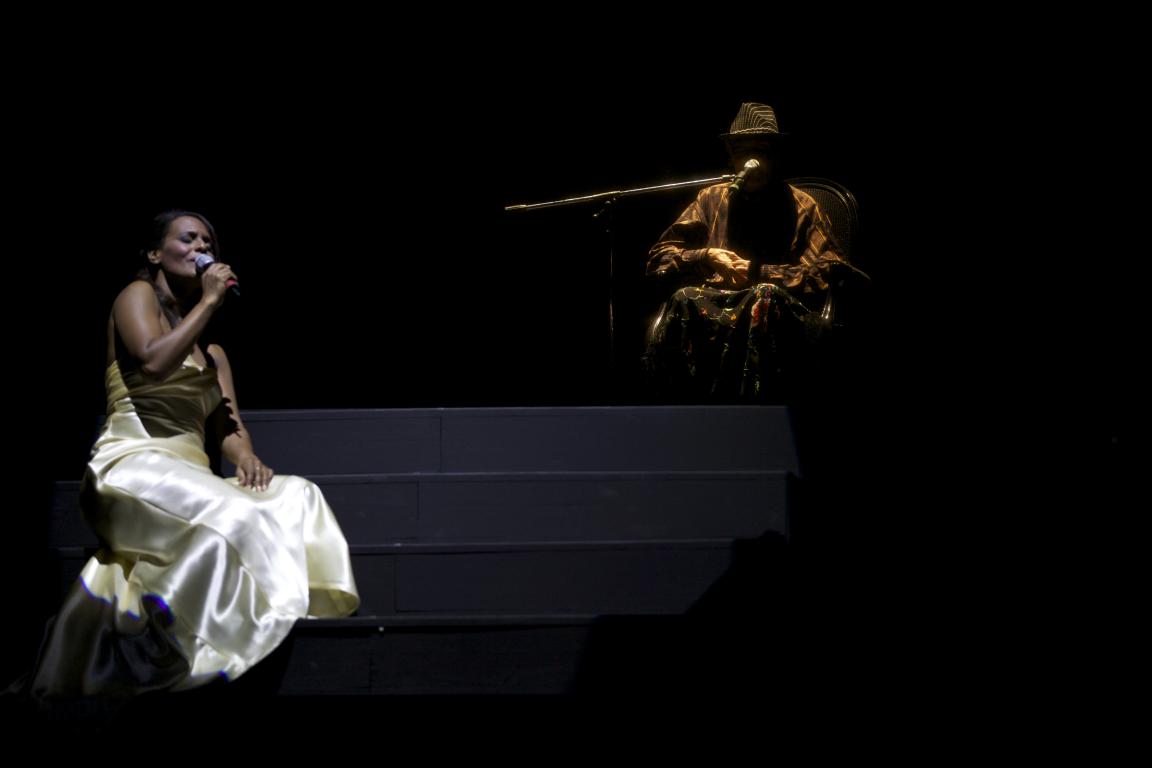 Together with Luis Carbonell, at the Joyas del tiempo concert, Teatro Mella, Havana, 2013.
Together with Luis Carbonell, at the Joyas del tiempo concert, Teatro Mella, Havana, 2013.
IT'S NOT THAT THERE ARE TWO MOONS IN THE SKY
For the interview route we linked titles of some songs on the album with the stations of this exchange constructed from the responses to a questionnaire. Because of Yaíma's candor with her voice messages from Havana, we can imagine her in front of her, smiling and cordial, like when she shares a coffee with someone close to her in a peaceful space in Camagüey.
─From the artist's references to the human being you have known, what is Roberto Valera like?
─Master Valera had the reference as a great composer of symphonic music, of the so-called classical music, professor at the ISA (University of the Arts), at the time director of the National School of Art, companion of Harold Gramatges and Isaac Nicola, that is , a whole personality and an institution when it comes to music. The best known for me was his choral composition for the poem Iré a Santiago written by Federico García Lorca.
“One day he called me to offer me his work. Listening to it, I told him that it was impossible for someone to say no. There began an enriching path for both of us. Perhaps because of this work we undertook was inspired and spoke about the voice to embroider chimeras. It has a lot to do with what he also wanted: a singer for the diversity of genres proposed in his music. That's what the album is about. What is new is how he approaches popular music with the tips of symphonic music. They are different codes.
“I have met a man who likes accuracy, who defends a lot what he wanted to do melodically even if the notes are dissonant, and how he also defends what the performer wants, because obviously the message of the song reaches better. It is not about the singer who accompanies the orchestra, but the other way around.”
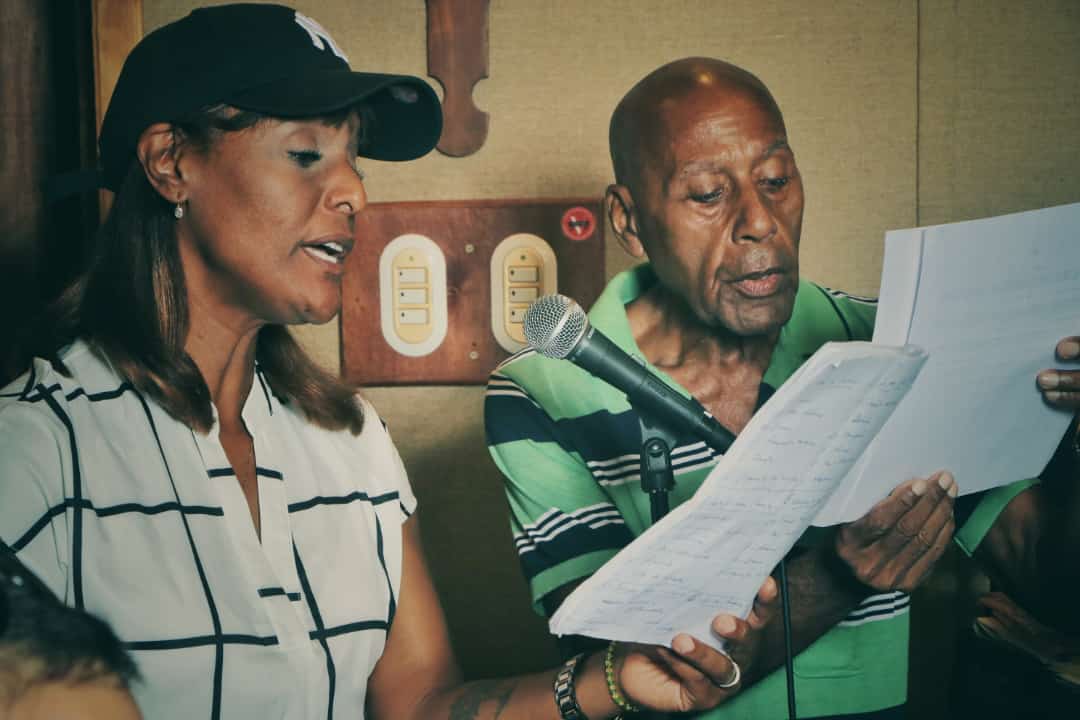 In a work session with Roberto Valera.
In a work session with Roberto Valera.
─What happens in a session with him in the studio?
─Working with Valera is something very interesting. First, he does not impose. He is not a person who doesn't listen or who does exactly what he wants. That is the basis of the success of this album. Also, perhaps being a little far from the recording codes of popular music, it gave us the freedom, especially the base musicians, to contribute a lot to the rhythmic and harmonic part, of course, with respect to the essence of the music. In the studio he is a calm person, but when something came up that he didn't like, he closed his eyes... At 85 years old, what could he not have lived or experienced? Throughout this time he showed the attitude of enjoying the work process, having young musicians interpret it and the fact of sharing the musical production. We learned a lot.
─Why are they also twelve jewels for you?
─By defending an album I already feel it as part of my career. Now the Twelve Jewels are as much mine as they are Varela's. If you do not have that sense of belonging, the work will not turn out well, with the desire that they be transcendent works due to their high qualitative value. We are not talking about banal jewels but about twelve jewels in defense of the Cuban song, of its genres, so that young people know that it is not something for old people or "outdated things" but rather Cuban popular music, for which Cuba ensures a place in the world. The album contains the imprint of my singing, my feelings, my passion, my love, which is why for me it is also twelve jewels.
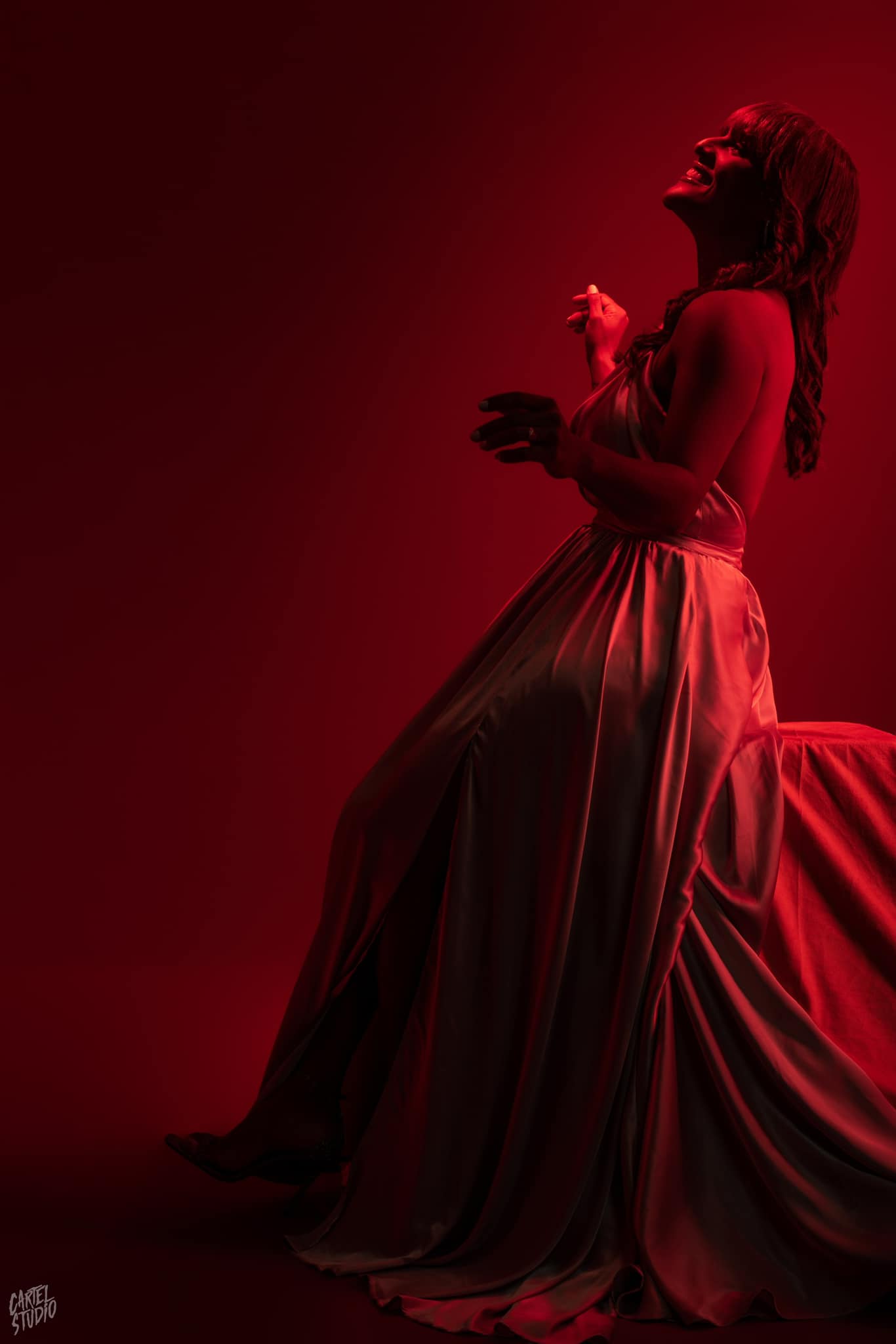
TIME FOR A TIME
Twelve Jewels opens with a seductive song, titled Here in Varadero. Through the strings, the winds, the piano, an album is anticipated with the benefit of bodies of water. Each era has made its winds blow and generated different waves. As happens in the sea, only in groups has the wave been able to move and carry its energy from one stage to another. Also on this album we look for Tiempo para un tiempo.
─Of these relationships, which one makes you feel more fulfilled: the song and Yaíma, the song in Yaíma or Yaíma in the song? Because?
─The song in Yaíma. Whenever you make a decision in life it has consequences for better or worse. Initially when someone told me that she could sing, specifically Irma Sariol from Camagüey, she performed trova by Silvio Rodríguez and Pablo Milanés. Other people, in Camagüey too, Leopoldo Lastre and Servando Vázquez told me: <<voices like yours are for the song, the ballad, the bolero, the feeling>>. Perhaps due to youth or immaturity, Elena Burke and Omara Portuondo were not to my enjoyment, I thought they were for older people; but upon entering that world of feelings, emotions, lyricism, passions, I felt identified with the song.
“So, everything that the song in Yaíma provokes, everything that the song in Yaíma inspires and everything that it makes you feel, there are many things to justify yourself, to argue about the song in Yaíma. The song motivates me to this new album, Twelve Jewels, although today in the world and especially in Cuba it is not heard or defended. The young, less knowledgeable audience needs to know, feel, and identify with Cuban singing, which is neither influenced by American nor Mexican influences. There is a Cuban song. “There goes my passion.”
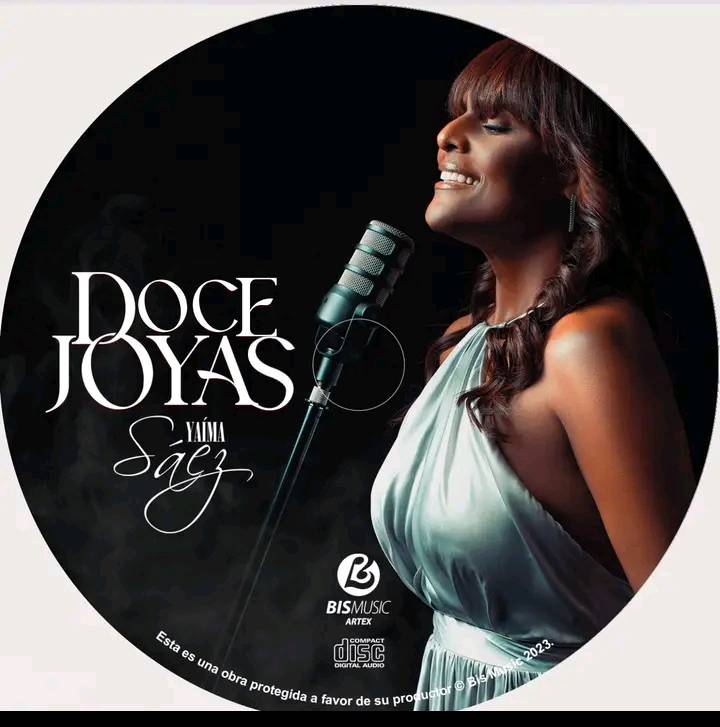
THE EXCEPTION TO THE RULE
For Yaíma, Twelve Jewels marks a moment of exploration and expansion, why not, of her capabilities as a music professional who knows the market and is willing to reach the goal against all odds. As the saying goes: <<he who does not risk, does not gain>>.
─Tell me about the experience so far with the Bis Music Label
─With Bis Music I have had very nice experiences since my first album, Identidad (2015). Lucía Huergo was going to be the music producer, unfortunately she died before, but there has always been a good reception. Then Bis Music joined forces with another record label, Egrem, in a peculiar event, for an audiovisual. It was in 2017 with the Armonía concert to promote the album of the same name. Then I was part of the album A Veces, a Voces, produced by Anaís Abreu, 2023 Cubadisco Award in the Song category. Now knocking on the door for Twelve Jewels, she also greeted us with a supportive attitude.
─What was the musical production before and after your debut with that role?
─From the first time in a studio I have liked being in the process. I'm not one of the singers who only goes on the day of recording. Everything there fascinates me, even though it is one of the most difficult things for me due to the demands of recording. I prefer to live in the theater. Luckily I have had very good producers like Efraín Chibás, who was a pianist for Los Van Van. My first album was his debut, and he worked with me for a good part of my career. The producers count on me, depending on whether I feel comfortable. There has been respect. This is what happened in Harmony.
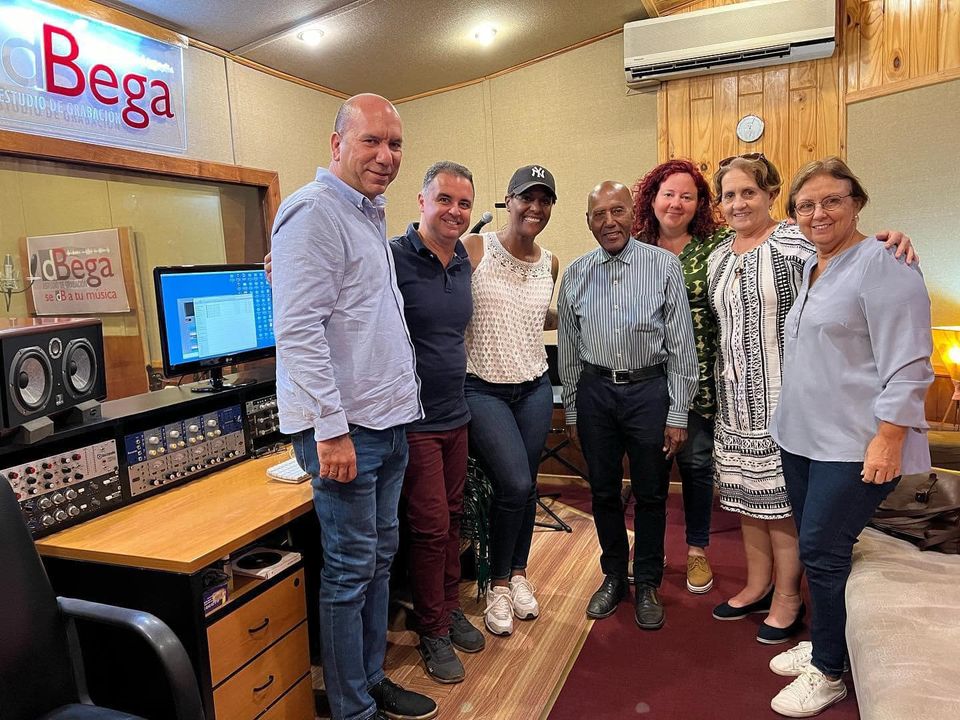 Part of the equipment at the dBega Recording Studio.
Part of the equipment at the dBega Recording Studio.
“Now, it was not the decision for me to be a producer. Undertaking the recording of the album had its well-defined responsibilities, but due to circumstances of people who are no longer in the country I decided to take on the musical production with Roberto Valera. Then the pianist Ángel Toirac joined, especially in the pre-production and recording process. I appreciate every criterion, even contradictions, and the collaboration of the musicians even when the album has not been paid for. The dBega Recording Studio was important, for its professionalism; to his engineer Carlos de la Vega.
“On the job, I realized that it is much more than being in a studio and saying <<wait, for the recording>>, <<you are in chrome, repeat the phrase>>, <<this is not what I want>> >. It is the logistics of how long an album takes, the days of recording, the transportation of the instruments, which ones go first; the acoustic preparation, the microphones, how the sound engineer, the assistant, the musicians feel... When it was almost time to record the voice, I felt not prepared enough to perform. Then, when singing you hear what you didn't hear before and you have to concentrate a lot. It was enriching. “I felt very respected by the musicians.”
 Cuban radio is the privileged medium with the initial promotion of Twelve Jewels.
Cuban radio is the privileged medium with the initial promotion of Twelve Jewels.
DO YOU KNOW OF A FIRE THAT DOESN'T GIVE HEAT?
With warmth, Yaíma Sáez insists on gratitude. She could count the steps of her career based on her own will, personal effort, stubbornness to achieve her dream as an artist; even so, she would never appear alone on the scene, because in her home she learned to cultivate every feeling or attitude of recognition to those who have put their hands, their shoulders, their hearts to clear the way for her and with her.
─You draw a map in thanks to people from Cuba, Canada, Colombia and Spain. To what do you attribute that people from distant places support you and love you?
─Perhaps those who are not involved in the recording world, they do not know that to be able to record you need a lot of support, collaboration, understanding that it is not a disk for memory or a file in mp3 format, but rather such an arduous process that requires people, good friends, family, who believe in your project. I must mention Don Shipley, from Canada, a businessman who sponsored the making of the album. Dr. Antonio Manrique, director of the Museum of Music and Records in Finland, Colombia, a tremendous friend, sponsored the cover design. Friendships in Spain had to do with my image. I also thank the Ludwig Foundation of Cuba, Efraín Chibás, Lázaro Rivero “El Fino”, a personality on the double bass; Yaíma Rey in the advertising part, was in the recording process; to my agency Musicalia who supported the recording process of almost 20 days. Because of them we came to a happy conclusion.
─How was Marta Valdés involved?
─I also thank Mrs. Marta Valdés, to whom we had entrusted the notes but she had health problems. She was somehow immersed too. There was communication between Valera, her and me. When something was recorded, she was sent to listen, because she is an authorized voice in the song. She had that criterion that what she heard and perceived was of tremendous harmony. There is an anecdote about her, in one of her audios she says that when listening to that recording process she got the idea that someone from the town was going to come out selling ice cream bites, because of that happiness and harmony during the recording process. Of course, there were contradictions, discussions, obstacles, difficult moments but the fact of achieving this album stood out in everything.
I AM THE ONE WHO SINGS TO YOU
The finishing touch to close the album is Yo soy la que te canta. Valera and Yaíma as the main faces of this production deliver an invaluable ensemble. There is a detail. The title Twelve Jewels nods to the number of precious stones in the Bible, however, it goes beyond a specifically religious connotation to connote the meaning of the Cuban song for spirituality, identity and rootedness in our culture today.
─When will the album be available to the public?
─We are doing everything possible for the official launch of the album at a press conference on February 28th, both for digital platforms such as Spotify and with physical copies with at least one circulation for the public. We have all the support of Bis Music. We chose that day because it is the birth of Elena Burke and since it is an album for Cuban songs, who better to pay tribute to than that great woman from Cuba.
─Will Camagüey be able to hear a preview on your next visit to the city?
─We intend a very strong schedule from a radial point of view. Although it may not seem like it, radio in Cuba has a tremendous reach and is the medium closest to the people. We want the people to listen to the Twelve Jewels, for now through the radio. When I do a concert in the theater I like to do it with everything, as it should be, with the lighting design, the sound, the artistic direction, the musicians on stage... That, for now, is not going to happen, because we do not have the means nor the conditions for a concert of that magnitude.
“Of course, Camagüey will have it and there we will present on different programs on Radio Cadena Agramonte and Radio Camagüey for this date for the 510th anniversary of the Villa del Puerto del Príncipe. A gift, the Twelve Jewels by maestro Roberto Valera in the voice of Yaíma Sáez. I hope that the people of Camagüey enjoy this song in love as much as I do, as our dear Marta Valdés said, so they will soon have it.”
Translated by Linet Acuña Quilez

